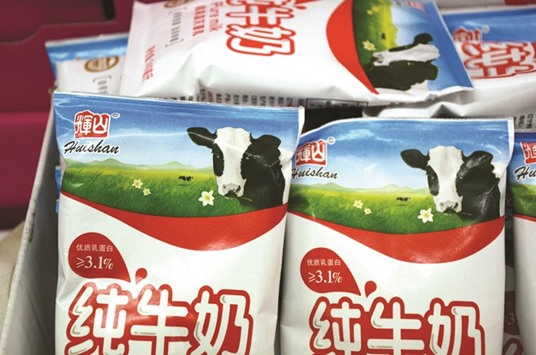China Huishan Dairy Holdings Co, which saw $4bn wiped off its shares in a single day last week, said yesterday it had missed loan repayments and lost contact with a key executive in charge of its finances and cash.
The country’s largest integrated dairy firm denied reports of fraudulent invoices and stolen cash, but laid out the depth of its unfolding crisis in a lengthy statement, including that almost all of the shares owned by its controlling shareholder had been pledged as collateral.
Huishan, founded in 2009, grabbed headlines last year when it sold and leased back part of its herd, but its most recent troubles have laid bare risks of excess leverage and financial engineering in unexpected quarters of corporate China.
Huishan has been on the backfoot since a December attack by US-based short-seller Muddy Waters.
But it was months after that, on Friday, that its shares crumbled 85%, and rumours swirled.
After finding it had been “late in some bank payments”, Huishan’s chairman Yang Kai asked the regional Liaoning government for support and met with 23 creditor banks last week to ask for loans to be rolled over.
While creditors had shown support then, the sudden share drop had raised concerns they may no longer back Huishan.
“Given the significant decrease in share price of the company and the recent media reports, there is no assurance that such banks’ (supportive) views would remain unchanged,” it said.
Huishan’s controlling shareholder Champ Harvest, which owns 70.8% of its stock and is majority held by Yang, has pledged nearly all of the shares to secure loans.
These include a HK$2.14bn ($275mn) loan with Ping An Bank last year backed by 3.4bn Huishan Dairy shares while a further 6bn shares were used to secure loans and margin financing for Champ Harvest and other firms controlled by Yang. Ping An declined to immediately comment. “Anybody holding those shares as collateral will be concerned given the drop in share price because it has a direct impact on the loan recoverability if the underlying business is not sound,” said Ted Osborn, a Hong Kong-based partner at PwC who specialises in debt recovery.
Its current woes are a long way from the fanfare of its $1.3bn IPO in 2013 when Huishan sold itself as China’s largest ‘grass-to-glass’ dairy firm, producing the alfafa that the cows eat all the way to the milk – a structure touted to offer better control over quality.
The company operates 82 farms in Liaoning province but is much smaller than rivals such as China Mengniu Dairy, generating less than a tenth of the revenue.
Huishan said the Liaoning government had proposed an action plan to solve any overdue interest payments within two weeks and to help bolster the group’s liquidity within a month amid an increasingly challenging environment.
The company also said it had not been able to reach one of its executive directors in charge of the firm’s finances and cash since March 21, when she indicated work stress and said she would take a leave of absence and did not wish to be contacted.
The executive, Ge Kun, had overseen the group’s treasury and cash operations and had managed its relationships with the company’s main bankers.
The firm refuted media reports that Bank of China had conducted an audit of the firm and found a large number of forged invoices and that the firm’s controlling shareholder had misappropriated up to 3bn yuan.
A Shanghai-based spokesman for Bank of China said he was unable to immediately comment on the matter.
In December, short-seller Muddy Waters questioned Huishan’s profits and said it had inflated spending on its cattle farms to artificially raise capital expenditure figures. Huishan’s shares, halted since March 24, will continue to be suspended until the board can get more clarity on the firm’s financial position.

Products of Huishan Dairy are seen at a supermarket in Shenyang, Liaoning province. China’s largest integrated dairy firm denied reports of fraudulent invoices and stolen cash, but laid out the depth of its unfolding crisis in a lengthy statement, including that almost all of the shares owned by its controlling shareholder had been pledged as collateral.
